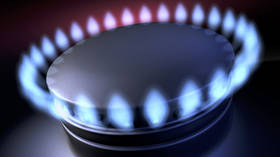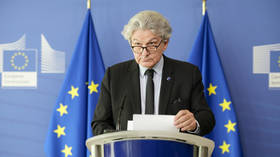What is the EU’s alternative to Russian gas?
The West is looking to the Eastern Mediterranean to replace supplies from Moscow

The European Union on Wednesday inked a deal with Egypt and Israel for shipments of liquified natural gas (LNG) to its member states. Brussels hopes the agreement will help the continent to reduce energy dependence on its major supplier, Russia. RT explores whether those expectations are realistic.
- What does the trilateral agreement mean?
It is expected to increase Israel’s exportation of natural gas through pre-existing pipelines to Egyptian ports, where it can be pressurized and liquefied, before being transported to Europe by sea. Some Israeli gas is already being sent by pipeline to liquefaction plants on Egypt’s Mediterranean coast, from where it is re-exported as LNG. - How much gas could Israel export?
Israel currently sends around five billion cubic meters of gas per year to Egypt. Cairo had earlier signed contracts with the country for the purchase of 64 billion cubic meters (bcm) of gas over a decade. The two sides later extended the deal to 15 years, with an increased volume of supplies of up to 6.9 bcm per year. - How much fuel could be rerouted to Europe?
Israeli Energy Minister Karine Elharrar stated earlier that it’s unlikely the country would be able to send “huge quantities,” given that most of its present capacity is committed to Egypt, Jordan and the domestic market. Officials have said it would likely take a couple of years before the exports could be significantly expanded. - Is the infrastructure adequate?
According to estimates, a significant increase in gas exports by Israel would require major long-term infrastructure investment. Moreover, Egypt’s extensive natural gas facilities on the Mediterranean have stood largely inactive since the country’s 2011 uprising. - Is there any other route for Israeli gas to the EU?
The EastMed project, a seafloor pipeline linking Israel to Greece and Italy via Cyprus, could be another option for gas supplies to the European countries. The project, which is heavily supported by the United States, is expected to deliver around 10 bcm of natural gas to the EU through Greece and Italy. However, the EastMed is expected to meet just 10-15% of the EU’s projected natural gas needs. - Could the volumes be sufficient for Europe?
No. Europe’s total gas demand stands at 512 bcm a year. According to estimates, Israel’s supply, extracted from three offshore Mediterranean gas fields, will be nowhere near Russian capacity. Tel Aviv produces roughly 12 bcm of natural gas a year, though industry analysts say at least double that amount exists in unexploited reserves.
Meanwhile, Egypt’s Idku and Damietta LNG plants have a total capacity of 12.2 million tons per year, which could provide around 17 bcm of natural gas. A significant boost in supplies would require the development of new large gas deposits in the Eastern Mediterranean area. - How much gas has Russia supplied to the EU?
In 2021, the European Union imported 155 bcm of natural gas from Russia, accounting for about 45% of its gas imports, and close to 40% of its total gas consumption. The trade bloc has faced energy difficulties since imposing sweeping sanctions on its major gas supplier. - Can Europe replace its Russian gas?
It won’t be easy and it won’t be cheap. The European Union will have to compete with Asian, and other, buyers for limited global supplies, and will pay higher prices – much higher. Europe relies on Russian natural gas to heat homes, cook meals, and generate electricity in most of the bloc’s 27 member states. Weaning the continent off cheap and abundant Russian gas would be a disruptive prospect for the region’s economy.
For more stories on economy & finance visit RT's business section
You can share this story on social media:
Dear readers! Thank you for your vibrant engagement with our content and for sharing your points of view. Please note that we have switched to a new commenting system. To leave comments, you will need to register. We are working on some adjustments so if you have questions or suggestions feel free to send them to feedback@rttv.ru. Please check our commenting policy












